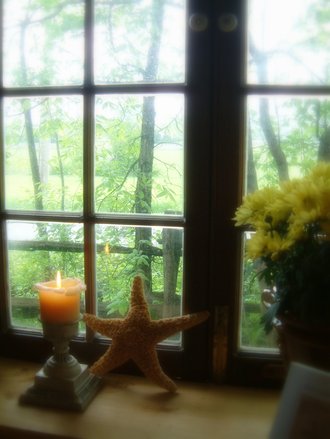Continuing on with the Twelve Principles from our Pagan Monasticism project, but first I wanted to mention that each of these is dedicated to (or you could say inspired by) a different deity. I’ll talk about each of them later. It is an eclectic assortment of gods, but we are an eclectic group. (Most of us actually focus strongly on one particular culture or pantheon or one specific god, in our personal practices, but when we come together, we all honor whoever is being honored by whoever is running the ritual.)
2. I will maintain simplicity in my possessions. Avoid rampant consumerism. Buy what you need and keep it simple. If you buy something new when your old one is still perfectly serviceable, find a good home for the old one. Recycle. If you buy for pleasure, make sure that it is something that will continue to give you pleasure for a long time.
 This is one that has always come easily to me. I’m naturally extremely frugal. The path I’ve chosen in life isn’t one that leaves me with much disposable income, and that is okay. But stuff seems to accumulate anyway.
This is one that has always come easily to me. I’m naturally extremely frugal. The path I’ve chosen in life isn’t one that leaves me with much disposable income, and that is okay. But stuff seems to accumulate anyway.
Growing up, this was never a problem. My mother didn’t like living in one place for more than a couple years, and every time we moved was a time to reassess each item you own to see what will come with us to the next house. Mom would say, “Here is your toy box. You can keep what fits in the box.” You don’t buy a lot of stuff when you live like that.
It was a hard adjustment for me, moving in with Raven. Living in one place, even for just a decade, you tend to accumulate a lot more stuff. (And Raven and Bella both like stuff.) They don’t actually buy much, but stuff just shows up, mostly gifts or barter. (“I don’t have much money, because my husband ran off with another woman last month. Do you want his circular saw? He left it behind.”)
Our house is sort of a retirement home for other people’s stuff. It is where stuff goes to live out its last few years before it goes to its final resting place, or to seek out some last hope of possibly being useful. Much of the stuff has already lived a hard life. Most of it is in too rough shape for a charity shop to take it. Some of it was of marginal value to begin with.
I’ll repair whatever I can, but there is a lot I can’t repair, and with modern manufacturing, paying for skilled repair is generally substantially more than the replacement cost of nearly anything I can afford. I love the idea of “Buy quality goods that will last a lifetime.” but the few goods still made to last a lifetime are generally laughably out of my price range. Besides, accidents happen. A few years ago, I bought a nice quality durable pair of pants, for the first time in my adult life. They cost almost ten times more than any other pair of (thrift store) pants I owned, meaning something like $60. I told myself they were a good investment. The second time I wore them I knelt down to see what had spilled under the washing machine and realized I was kneeling in bleach. I haven’t bought another pair since. Perhaps it is because a decade of owning things that were only two steps away from the trash heap has made me exceptionally careless with my things, but I’m at a point where quality goods seem like a foolish and risky investment.
I found that as my budget got tighter, it was harder and harder not to accumulate stuff, because I couldn’t let go of stuff as easily. “What if I need it?” became a much more serious question when replacing it was no longer a trivial option. Not long ago, we were given a secondhand blender. Our old blender (despite being chewed by the dog) still works, but I don’t know anyone who wants my dog-chewed stick blender. I can’t bring myself to throw away a fully functional blender. Eventually this blender will break, so why not keep the old one as a spare?
Anyway, I’m about to enter an exciting reevaluation of my personal possessions. I am moving into my VERY OWN ROOM next month, right after I put down flooring. When we were planning the extension on our house, I desperately wanted a room entirely of my own, and the only space available was a tiny little slice of attic. Wide enough for a bed at one end, a closet at the other, and a sloped ceiling that is only full height in the area right between the door and window. I can squeeze in some shelves, and maybe a little desk or something, but I’m going to have to be very selective about what I keep. (My computer and office stuff can go down into the new office downstairs, and my musical instruments can go with all the other instruments.) I’m excited about the new room, but I’m also excited about the challenge of making such a tiny space work for me, the discipline of cutting down to what is really essential.

 That is Raven’s description from the
That is Raven’s description from the 
 We start, and continually come back around to, the gods the Order was named for. The Horae, or the Hours, are Greek goddess of both the cycle of the year and the natural order of society. I am not a scholar and Classical stuff is really not my thing, but you can read a good deal about them on
We start, and continually come back around to, the gods the Order was named for. The Horae, or the Hours, are Greek goddess of both the cycle of the year and the natural order of society. I am not a scholar and Classical stuff is really not my thing, but you can read a good deal about them on  One thing that came out of the Order of the Horae project was the
One thing that came out of the Order of the Horae project was the 


You must be logged in to post a comment.